Existing User Log In
New User Registration
Register for a free account to gain full access to the VGChartz Network and join our thriving community.



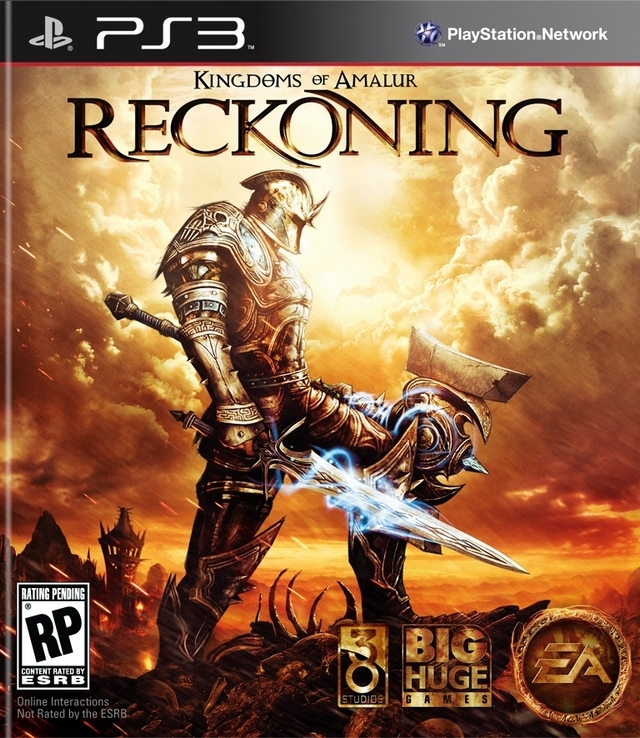

America - Front


America - Back

The WRPG has evolved rapidly over the last decade. Plot progression has gone from linear to moral dialog options, text has become voice acting, and combat now ranges from classic clicking to full-on third person shooter. Kingdoms of Amalur: Reckoning seeks to advance that last aspect even further. Dynamic combat headlines this debut title from 38 Studios, founded by former Major League Baseball pitcher and all-around nice guy Curt Schilling. While Reckoning is a good first effort, this fledgling franchise will need more work before it can take its place among the RPG giants.
After a short introduction sequence to explain the immortal army currently threatening the races of the world, Kingdoms of Amalur introduces you to your main character, a mortal who has died in the war but been revived through mysterious means. You have amnesia about your past life (of course), but your rebirth has somehow left you with no fate, and as someone who exists outside of fate you posess the ability to change and even remove the fate of others. You immediately depart on a quest across the Faelands to discover your past and save the land from the evil Tuatha.
While all of this sounds good on paper, in practice it results in little more than a serviceable story and setting. The land of Amalur owes a heavy debt to previous fantasy locals such as Middle Earth, Tamriel, and Albion. Likewise, the plot offers only small motivation to continue your journey, and no thrills or twists throughout it. Indeed, at the end of the game you actually have to have most of the overarching plot explained in the last hour. Don't mistake this; it's not a plot twist (or at least if it was meant to be it's a very poor one). The game simply takes 15 minutes and says "Oh, and this is what's been going on behind the scenes the entire game." The characters are similarly uninteresting for the most part, and few of the citizens around the world have much personality at all. There is some depth to be found in the world if you take the time to read about it, but it won't capture the imaginations of many.
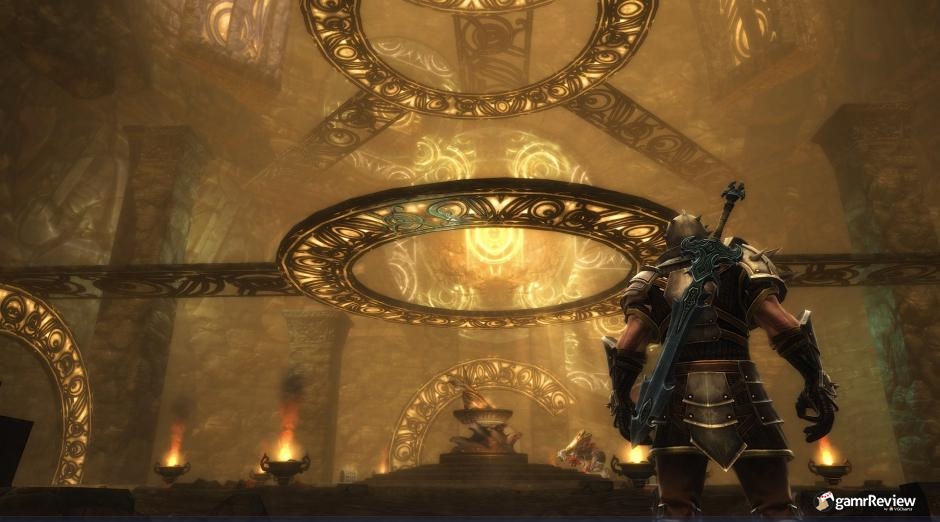
Luckily the game has more going for it than its plot. Namely, the combat. Reckoning was once described as God of War meets Obilivion, and at that's not too far off. The combat is tight, fluid, and fast. Like the God of War games it claims to mimick, the combat is heavily focused on doing high damage to many enemies through fluid, chained attacks. Each weapon has its own attack style, and spells and special attacks augment this with great flourish. In particular the explosive power of the high end magics is realy a blast to toy with. In addition you can spend accumulated fate from killing opponents to enter a slowed time mode where you deal much more damage and can use a QTE to end multiple weakened opponents at once for bonus experience.
There are three main schools of progression which determine your abilities in combat: Might, Sorcery, and Finesse. As you might imagine, these correspond to Warrior, Mage, and Rogue standard RPG roles. Each skill has a World of Warcraft-style talent tree, with the best abilities unlocked at the end. You can combine multiple schools of combat, but I strongly recommend against it due to the fact that this will prevent you from obtaining the best abilities in any school without excessive leveling.
Warrior is a standard brute force approach, with lots of armor and power, while Rogues do best with stealth and speed. Mages can deal the most damage, especially over a larger area. Interestingly, all three play styles actually have similar combat. All have a variety of weapons which combine well. All can block and dodge, and all have powerful skills they can activate to augment their weapons. The mage has more skills, and by the end of the game (when you have the gear to have infinite mana) fights almost entirely with them, but all the classes have a heavy focus on avoiding taking lots of damage through timing and skill. This makes the combat a lot of fun, and very fast-paced no matter what your play style.
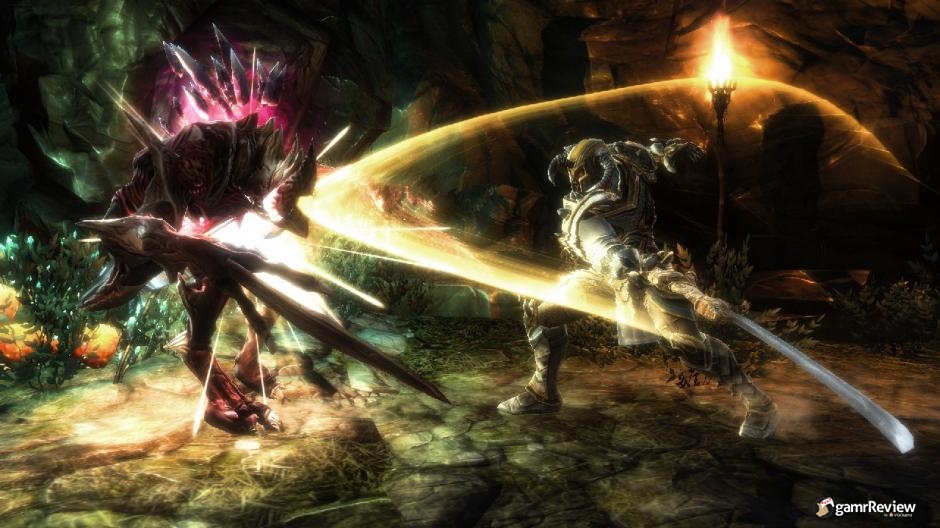
Unfortunately a few factors prevent the combat from being truly spectacular. The camera can be a bit irritating. Indeed, in combat it will barely move on its own, forcing you to try to control it while actively dodging and attacking. This compares poorly to God of War, which creates optimum camera angles to assist you in combat. Of course this is harder to do in Amalur, which is an open world game. More unfortunate than the camera are the encounters themselves. Enemies lack variety, and you will have faced most of the potential opponents and combat styles within the first couple hours of the game. Boss fights vary little, but generally offer a strong enough opponent to create a fun challenge. Two of the boss fights feature giant opponents reminiscent of God of War, but these fail to come close to their inspiration in fun or scale. Meanwhile the smaller encounters are generally resolved almost instantly and without challenge once the more powerful skills are unlocked.
All of these combat systems will be used a lot as you progress through Amalur's large world. You'll progress through the Faelands through a series of subregions each filled with towns and sidequests with clear influences from the Elder Scrolls franchise and World of Warcraft. Unfortunately, the game world doesn't offer the polish or variety of either. Quests are almost all simple "find and kill" quests, and generally involve treks through linear repetitive dungeons. Almost every dungeon in the game is nothing more than a straight path with a couple branches in which you'll find chests or hidden items, and they are generally all in dark caves. The quests themselves rarely involve more than standard (and tired) RPG fare of "kill a certain number of these" or "deliver this to this person."
This tedium of repetitive questing is exacerbated by the fact that the first third of the game is spent questing through nearly identical looking regions of forest. These areas feel constrained and have few features to differentiate between one section and another. Even when the world finally opens up to more expansive fields and canyons, it still feels like wandering a smaller and less open version of Azeroth from World of Warcraft, and it lacks the organic, living-world feel of something like Skyrim. Kingdoms of Amalur will never let you forget you're playing a video game, and that's not a good thing.
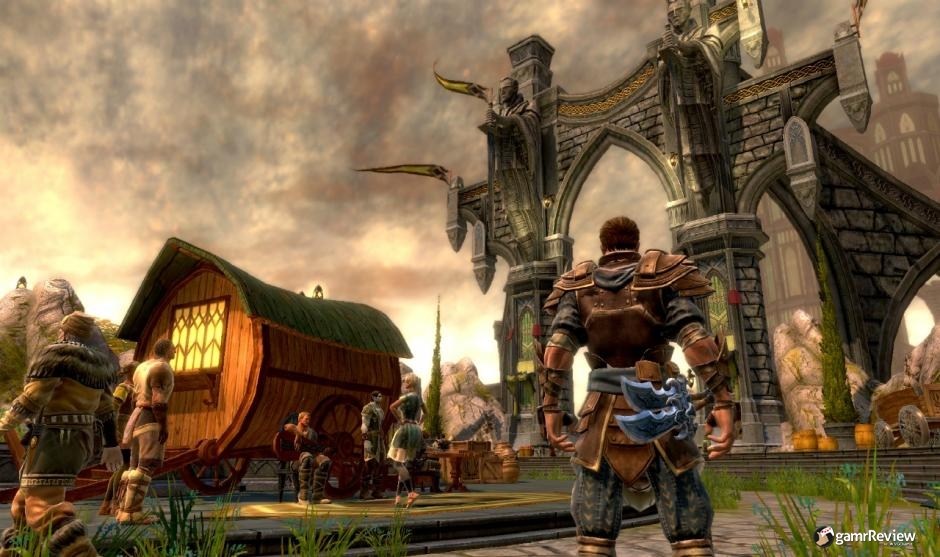
There is some gameplay outside of combat. Reckoning offers a variety of crafting systems. Blacksmithing can be used to create armor and weapons for any class, Alchemy can be used to create a variety of beneficial potions, and Sagecraft lets you create gems to socket into your equipment and improve it. These are all leveled up separately from your combat abilities. Other non-combat abilities include the ability to persuade people into beneficial dialog options, to detect hidden items and to see enemies on your mini-map. You can earn property by completing quests in certain towns, though there is not a lot of benefit to having multiple houses other than completionism.
Some of the biggest flaws in Kingdoms of Amalur are in its presentation. On a technical level, the graphics are sub-par even for the beginning of this generation. Textures are weak, draw distance is tiny, and facial expression is almost non-existent. In spite of this the game still suffers from pop-in while exploring and frame rate drop during hectic combat. Sadly, the fairly generic artwork does little to alleviate this issue. The music fares better, but doesn't stick with you like the scores of some of the game's RPG competitors, and the voice acting is solid but not spectacular.
More damning are the game-breaking bugs. On a couple of occasions during sidequests, the game would not allow me to continue, either due to a quest NPC not being where they should be or due to their not responding to me at all about the quest. Even worse, on two occasions the game bugged out in a way that prevented me from completing or progressing the main story. At one point an area with a quest NPC became walled off by invisible walls. I could not get in no matter what. I had to fiddle with save files for 45 minutes to get it working, and lost quite a bit of progression in the process. About two hours later, near the end of the game, I couldn't get a major NPC to show up at all to progress and main quest, and again had to load an older save, losing progress. Bugs are never good, but bugs which halt progression are a major problem.
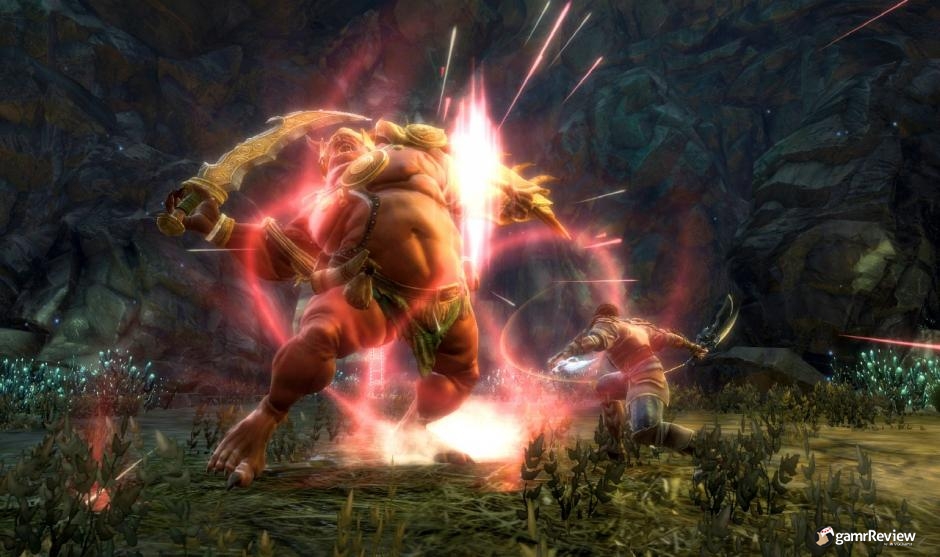
If you can get them all to work, the massive number of quests in Kingdoms of Amalur offer excellent value. The main story lasts a solid 16-20 hours alone, and there are enough sidequests and faction quests to take you over 100 hours of gameplay without repeating anything. The afformentioned lack of variety in the quests does hurt the value a little, but if you're really into the game and the combat it gives you plenty of reason to knock heads around for hours on end.
It's really tough to see a game like Kingdoms of Amalur: Reckoning, because there's a great deal of potential wrapped around a number of major flaws. The combat system itself is absolutely excellent, and it alone makes the game fun to play. Unfortunately a number of major issues such as a dull world and plot and major technical flaws damage the experience significantly. The game takes so few chances in its quests, setting, and story that really the only thing in it that stands out at all is the combat, and although that's enough to make Kingdoms of Amalur: Reckoning a fun game, it can't make it a great one.
This review is based on a retail PS3 copy of the game provided by the publisher.










| Total Sales |
0.09m
Japan |
0.37m
NA |
0.29m
Europe |
0.10m
Others |
0.85m
Total |
| 1 | n/a | 121,409 | 38,290 | 26,911 | 186,610 |
| 2 | n/a | 33,286 | 17,662 | 9,017 | 59,965 |
| 3 | n/a | 20,137 | 8,323 | 4,914 | 33,374 |
| 4 | n/a | 8,875 | 5,827 | 2,660 | 17,362 |
| 5 | n/a | 6,501 | 4,442 | 1,989 | 12,932 |
| 6 | n/a | 6,298 | 4,049 | 1,868 | 12,215 |
| 7 | n/a | 4,346 | 3,074 | 1,352 | 8,772 |
| 8 | n/a | 4,125 | 3,598 | 1,441 | 9,164 |
| 9 | n/a | 6,215 | 4,286 | 1,911 | 12,412 |
| 10 | n/a | 6,127 | 4,131 | 1,862 | 12,120 |
|
|
WagnerPaiva
posted 03/12/2013, 04:48
I own this game, and cannot say it is good, by any means, sorry. Message | Report |
|
|
|